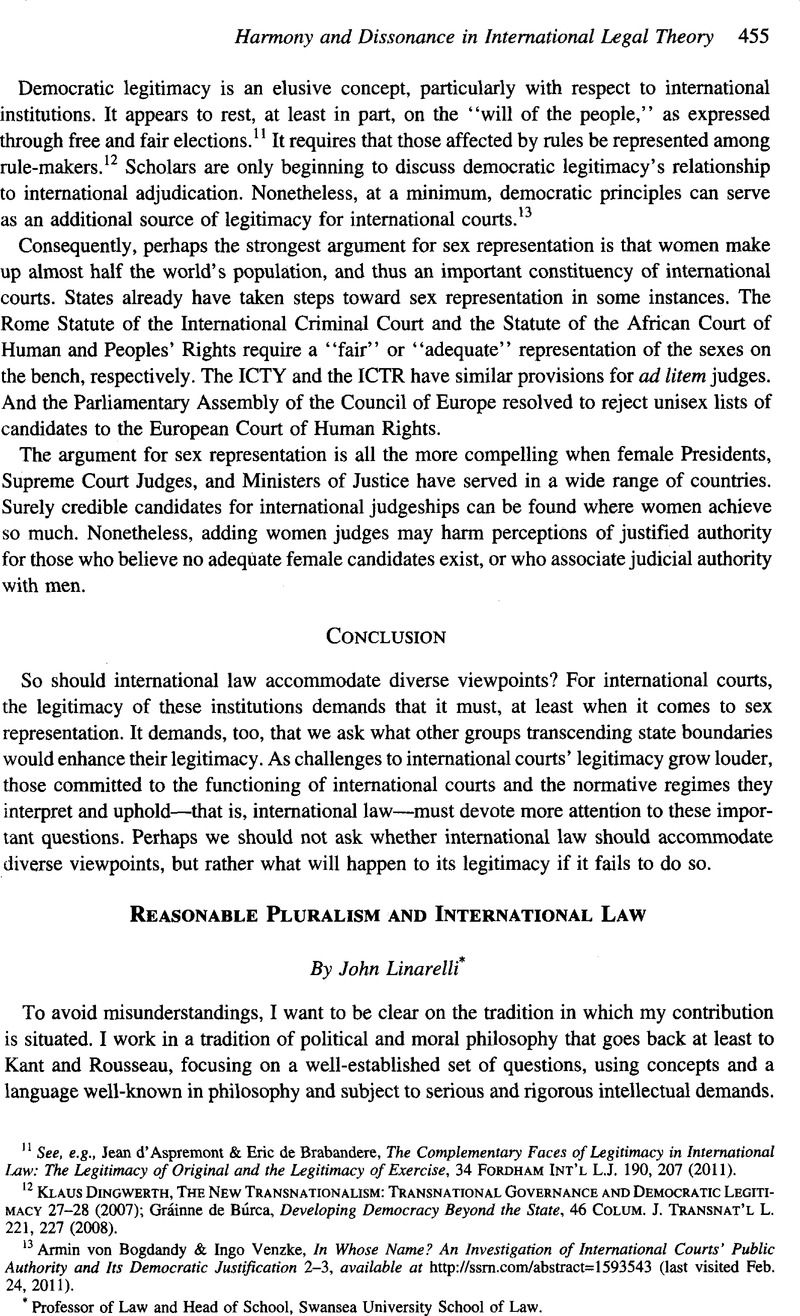No CrossRef data available.
Article contents
Reasonable Pluralism and International Law
Published online by Cambridge University Press: 28 February 2017
Abstract

- Type
- Harmony and Dissonance in International Legal Theory
- Information
- Copyright
- Copyright © American Society of International Law 2011
References
1 Hart, H.L.A., The Concept of Law 82–83 (2d ed. 1994)Google Scholar.
2 I agree with John Morss on this point.
3 Gosepath, Stefan, Equality, in The Stanford Encyclopedia of Philosophy (Zalta, Edward N. ed., 2011)Google Scholar, http://plato.stanford.edu/archives/spr2011/entries/equality/.
4 Nagel, Thomas, Equality and Partiality 11 (1991)Google Scholar.
5 I am grateful for Dean Claudio Grossman’s comments during the discussion following the panel presentations, which encouraged the panelists to focus on the universalism of human rights.
6 John Rawls, The Law of Peoples 40 (1999). See also Nagel, supra note 4, at 169.
7 Griffin, James, On Human Rights 138 (2008)Google Scholar. For just such a recent writer, see Sloane, Robert D., Human Rights for Hedgehogs?: Global Value, Pluralism, International Law, and Some Reservations of the Fox, 90 B.U. L. Rev. 975, 976 (2010)Google Scholar. For a view similar to Griffin’s, see James W. Nickel, Making Sense of Human Rights 168-84 (2d ed. 2007).
8 T.M. Scanlon, What weOwe to Each Other 333-34 (1998) (citing Hárman, Gilbert, What We Owe To Each Other 333-34 (1998) (citing Gilbert Harman, What is Moral Relativism!, in Moral Relativism and Moral Objectivity? 3–64 (G. Hárman & Thompson, J.J. eds., 1996))Google Scholar. Scanlon calls this a benign moral relativism. A skeptical form of moral relativism challenges the basic idea of morality as authoritative. Some claim that value does not have truth conditionality but is simply a matter of taste or preference. We have all had students in class who say “We all have our own personal morality.” Finally, some claim that morality is simply a matter of social convention. These ways of “handling” morality can be described as skeptical. I will put them aside here. Those who accept these arguments likely reject my moral justification thesis for the force of international law, so I am not going to get anywhere in dealing with these arguments.
9 Scanlon, supra note 8, at 329. Scanlon calls the latter parametric universalism.
10 Griitin, supra note 7, at 130-31.
11 Rawls and Scanlon use the same language. See Rawls, supra note 6, at 11, 40; Scanlon, supra note 8, at 335-42.
12 Scanlon, supra note 8.
13 Stephen Darwall, the Second-Person Standpoint: Morality, Respect and Accountability 119-26 (2006).
14 Brian D. Lepard, Customary International Law: A New Theory with Practical Applications (2010).
15 Rawls, supra note 6, at 11, 15, 40, 54-57; John Rawls, Political Liberalism (1993); John Rawls, the Idea of Public Reason Revisited (1999). On Dworkin’s notion of ethical independence, see Ronald Dworkin, Justice for Hedgehogs 368-71 (2011).




